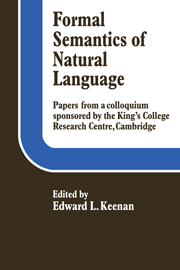Book contents
- Frontmatter
- Contents
- Notes on the contributors
- Acknowledgements
- Introduction
- I QUANTIFICATION IN NATURAL LANGUAGE
- II REFERENCE AND CROSS REFERENCE
- III INTENSIONAL LOGIC AND SYNTACTIC THEORY
- IV QUESTIONING MODEL THEORETIC SEMANTICS
- V PRAGMATICS AND SENTENCES IN CONTEXT
- Pragmatics in natural logic
- Changing the context
- Conditions of the use of sentences and a semantic representation of topic and focus
- Topics, sentence accent, ellipsis: a proposal for their formal treatment
- Preference semantics
- VI SEMANTICS AND SURFACE SYNTAX
Changing the context
Published online by Cambridge University Press: 05 November 2011
- Frontmatter
- Contents
- Notes on the contributors
- Acknowledgements
- Introduction
- I QUANTIFICATION IN NATURAL LANGUAGE
- II REFERENCE AND CROSS REFERENCE
- III INTENSIONAL LOGIC AND SYNTACTIC THEORY
- IV QUESTIONING MODEL THEORETIC SEMANTICS
- V PRAGMATICS AND SENTENCES IN CONTEXT
- Pragmatics in natural logic
- Changing the context
- Conditions of the use of sentences and a semantic representation of topic and focus
- Topics, sentence accent, ellipsis: a proposal for their formal treatment
- Preference semantics
- VI SEMANTICS AND SURFACE SYNTAX
Summary
Introduction
In recent years, the ‘point of reference’ has received considerable attention as a way of representing context in formal treatments of natural language. It encodes such information as who is speaking to whom, the time, what entities exist and what relations hold among them. It is an attempt to mirror the way in which the context forms a background against which a sentence can be true or false.
However, utterances do more than merely display themselves before a context and then vanish. They alter the context and become part of it. For instance, if I say
I am a foreigner
I have not only said something with a truth value depending on the situation in which I speak, I have also created a new situation in which
(2) a. I just told you that I was a foreigner
will be true if I address it to the same audience, and
(2) b. He just told you that he was a foreigner
will be true if used by a third party. The usual sort of analysis in terms of reference points sets out truth conditions for (2a) and (2b) that make them true if appropriate entities stand in a ‘telling’ relation. But there is nothing in the analysis of (1) which expresses its power to put the entities into the relation. What I would like to propose is that we invest (1) with such power.
Information
- Type
- Chapter
- Information
- Formal Semantics of Natural Language , pp. 287 - 296Publisher: Cambridge University PressPrint publication year: 1975
Accessibility standard: Unknown
Why this information is here
This section outlines the accessibility features of this content - including support for screen readers, full keyboard navigation and high-contrast display options. This may not be relevant for you.Accessibility Information
- 11
- Cited by
